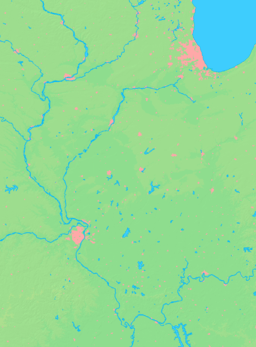Dunlap, Illinois
| Dunlap | |
| Village | |
| Dunlap welcome sign | |
| Country | United States |
|---|---|
| State | Illinois |
| County | Peoria |
| Township | Radnor |
| Elevation | 699 ft (213 m) |
| Coordinates | 40°51′39″N 89°40′41″W / 40.86083°N 89.67806°WCoordinates: 40°51′39″N 89°40′41″W / 40.86083°N 89.67806°W |
| Area | 0.54 sq mi (1 km2) |
| - land | 0.54 sq mi (1 km2) |
| - water | 0.00 sq mi (0 km2) |
| Density | 2,482.3/sq mi (958/km2) |
| Timezone | CST (UTC-6) |
| - summer (DST) | CDT (UTC-5) |
| Postal code | 61525 |
| Area code | 309 |
| FIPS code | 17-21176 |
| GNIS ID | 2398757 |
  Location of Dunlap within Illinois | |
| Wikimedia Commons: Dunlap, Illinois | |
| Website: http://www.villageofdunlap-il.gov/ | |
Dunlap, located on Illinois 91, is a small village in Peoria County Illinois, United States. Its population was 1,386 people as of the 2010 census. Dunlap is part of the Peoria metropolitan area and growth in the city of Peoria is extending towards the village. There are only a handful of businesses in the village's 16 blocks.
History
The town of Dunlap was officially established on June 12, 1871 on 40 acres of land owned by Alva Dunlap. The town was originally located on the Rock Island Railroad. The site of his former home is now occupied by the Prospect United Methodist Church. The meeting of the first Dunlap Village Council was on January 7, 1952, and the town petitioned for incorporation on February 19, 1952. The current Village Hall was built in 1995.[1][2][3]
A post office has been in operation at Dunlap since 1871.[4] Police services are provided by the Peoria County Sheriff’s Office. The Dunlap Volunteer Fire Department and Rescue Squad was established in 1899.[5]
Geography
Dunlap is located at 40°51′39″N 89°40′41″W / 40.86083°N 89.67806°W (40.860786, -89.678123).[6]
According to the 2010 census, Dunlap has a total area of 0.54 square miles (1.40 km2), all land.[7]
Demographics
| Historical population | |||
|---|---|---|---|
| Census | Pop. | %± | |
| 1880 | 146 | — | |
| 1960 | 564 | — | |
| 1970 | 656 | 16.3% | |
| 1980 | 824 | 25.6% | |
| 1990 | 851 | 3.3% | |
| 2000 | 926 | 8.8% | |
| 2010 | 1,386 | 49.7% | |
| Est. 2015 | 1,417 | [8] | 2.2% |
As of the census[10] of 2000, there were 926 people, 337 households, and 270 families residing in the suburb. Dunlap is a suburb of Peoria,IL and it is 15 miles from downtown. The population density was 2,482.3 people per square mile (966.3/km²). There were 350 housing units at an average density of 938.2 per square mile (365.2/km²). The racial makeup of the village was 98.52% White, 0.54% African American, 0.22% Native American, 0.51% Asian, and 0.22% from two or more races. Hispanic or Latino of any race were 1.30% of the population.
There were 337 households out of which 40.7% had children under the age of 18 living with them, 64.7% were married couples living together, 11.6% had a female householder with no husband present, and 19.6% were non-families. 16.0% of all households were made up of individuals and 6.5% had someone living alone who was 65 years of age or older. The average household size was 2.75 and the average family size was 3.08.
In the village the population was spread out with 27.1% under the age of 18, 9.6% from 18 to 24, 29.9% from 25 to 44, 23.8% from 45 to 64, and 9.6% who were 65 years of age or older. The median age was 35 years. For every 100 females there were 102.2 males. For every 100 females age 18 and over, there were 92.9 males.
The median income for a household in the village was $56,364, and the median income for a family was $62,000. Males had a median income of $42,083 versus $24,732 for females. The per capita income for the village was $20,407. About 3.1% of families and 6.3% of the population were below the poverty line, including 7.9% of those under age 18 and 12.5% of those age 65 or over.
Schools
The school district has Dunlap High School, 2 middle schools, and 5 elementary schools. Dunlap High School is on the southeast fringe of the village and serves many students from northern areas of Peoria. In the last few years the district office was moved to Peoria. The district superintendent recently conducted a study to determine if year round school would be feasible. After a very negative reaction from district residents, the idea was dropped. Dunlap High School has been increasing the number of students over the past few years. The school community is getting bigger. Wilder Waite Grade School is sometimes full, because it is a small school. Some kids might have to be sent to Hickory Grove Elementary School, or Banner Elementary School, when Wilder Waite Grade School gets full. Dunlap has 59 school buses for students. Dunlap is district 323 and it is a public school district. Wednesdays are always short days at Dunlap Schools by getting out an 1/2 hour early. The Elementary Schools hours are on Mondays, Tuesdays, Thursdays, and Fridays from 7:39 am to 2:45 pm, then on Wednesdays from 7:39 am to 2:15 pm. The Middle Schools hours are on Mondays, Tuesday, Thursdays and Fridays from 8:24 am to 3:30 pm, then on Wednesdays from 8:24 am to 3:00 pm. Dunlap High Schools hours are on Mondays, Tuesdays, Thursdays and Fridays from 8:18 am to 3:30 pm, then on Wednesdays from 8:18 am to 3:00 pm.
- Banner Elementary School Grades K-5
- Dunlap Grade School Grades K-5
- Dunlap High School Grades 9-12
- Dunlap Middle School Grades 6-8
- Dunlap Valley Middle School Grades 6-8
- Hickory Grove Elementary School Grades K-5
- Ridgeview Elementary School Grades K-5
- Wilder Waite Grade School Grades K-5
References
- ↑ "History of Dunlap". Village of Dunlap. Retrieved December 1, 2015.
- ↑ Callary, Edward (29 September 2008). Place Names of Illinois. University of Illinois Press. p. 100. ISBN 978-0-252-09070-7.
- ↑ Gannett, Henry (1905). The Origin of Certain Place Names in the United States. Govt. Print. Off. p. 110.
- ↑ "Peoria County". Jim Forte Postal History. Retrieved 4 November 2015.
- ↑ "History". Dunlap Fire Protection District. Retrieved December 1, 2015.
- ↑ "US Gazetteer files: 2010, 2000, and 1990". United States Census Bureau. 2011-02-12. Retrieved 2011-04-23.
- ↑ "G001 - Geographic Identifiers - 2010 Census Summary File 1". United States Census Bureau. Retrieved 2015-08-02.
- ↑ "Annual Estimates of the Resident Population for Incorporated Places: April 1, 2010 to July 1, 2015". Retrieved July 2, 2016.
- ↑ "Census of Population and Housing". Census.gov. Retrieved June 4, 2015.
- ↑ "American FactFinder". United States Census Bureau. Retrieved 2008-01-31.